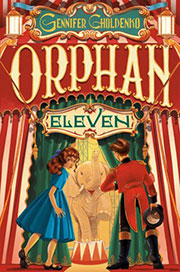McWilliams, Kelly. Agnes at the End of the World. 2020. Little, Brown, and Company. New York, NY.
Agnes swears that she can hear God singing in the world around her. But the prophet of Red Creek, the Commune where she lives swears that only he can hear God. Agnes is beaten until she finally denies the music of the world around her.
At 14 years of age, Agnes has become a model citizen for the prophet. She does everything she can to follow the rules and laws that govern the commune with one teeny, tiny little exception. Her little brother is a Type 1 Diabetic. Once a month, she sneaks off the grounds of the commune in the middle of the night and receives a cooler of insulin from the woman who saved her brother's life years before. Knowing that the penalty for dealing with outsiders is expulsion, Agnes continues to risk to keep her brother safe and healthy.
UNTIL
The day that Agnes is promised in marriage to a man in Red Creek who is older than her father. As Agnes struggles to come to terms with this new reality she realizes that Red Creek is not all that she has been led to believe. When she meets up with Danny to pick up her brother's monthly dose of insulin she discovers that there is a strange plague that is crossing the land, killing people right and left. The herald of the disease is a strange appearance of animals or people with a crystaline coating to their skin or fur.
When Agnes' sister is caught kissing the son of Agnes' betrothed and her sister is consigned to marry the elder.
The strange disease has moved onto the compound, and the Prophet is going to sequester everyone inside of the underground bunker. However, should Agnes decide to go underground with the prophet, it is a certain death sentence for her brother.
What will Agnes do? Will she be able to save her brother's life? What about the virus? Will it end all life as people knew it? Is it really the end of the world?
What I like about this book:
I love Agnes. I love how she thinks outside of the box and takes huge risks to save her brother and do what is right. The subplot of the story with Danny is a wonderful love story. Agnes exits the compound and adapts to a very uncertain life outside of the compound in a world ravaged by a pandemic.
The prophet. The history of the prophet and of Red Creek. I was so disturbed by the story of how the prophet had kidnapped his first wife and how he married off the young women to the old men in the compound all while keeping them undereducated and preaching to them about their inferiority to men - to whom they must be subject. I find this to be a cautionary tale, in many ways reminiscent of A Handmaid's Tale about what can happen to women when extreme views of religion are enforced upon them.
Type 1 Diabetes. This. So much involved in this subplot. The love of the sister who was willing to hide the diagnosis and dependence upon insulin from the elders in order to keep Ezekiel alive. The risks that Agnes was willing to take in order to keep Ezekiel alive - meeting with outsiders and running away from the compound. Putting off her marriage in order to find a way to make sure Zeke got his medicine. Watching Ezekiel at the end of the story as his sugar is out of control is heart rending. The story does a great job of raising awareness of Type 1 Diabetes, showing the very real health consequences.
The rebellious sister - Beth. Her spirit at the beginning was so phenomenal - so much spirit and a child so willing to risk everything in order to live life. The consequences of here kissing her love were severe, and her utter shame and embarrassment and total surrender to the wishes of the prophet were heartbreaking. Just loved how she ended up finally waking up and fighting for her life and the lives of the people of Red Creek after escaping from her prison.
The imagery at the end of Agnes sacrificing all for the people of Red Creek.
Pandemic reading during a pandemic.
I enjoyed the outsiders view of Red Creek, and how it informed our views and understanding of Red Creek. It was a nice plot device that really enhanced our understanding of the larger picture of the cult within the story.







